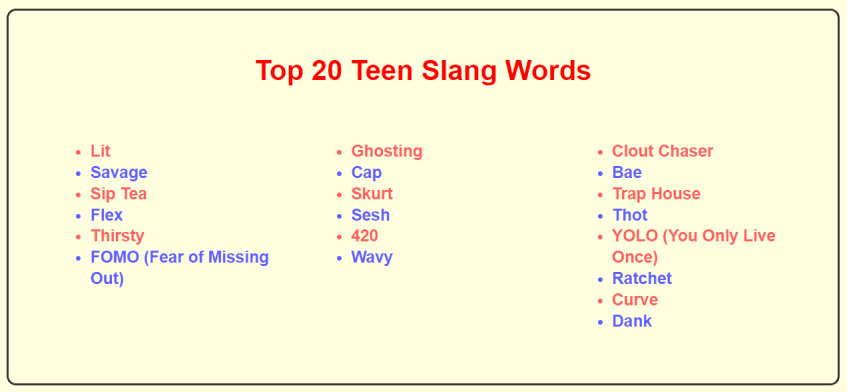LOL Meaning
LOL stands for Laugh Out Loud. LOL is an internet slang initialism used to express amusement or highlight a funny remark, picture, etc.
How Is LOL Used? Use Cases & Examples
LOL was considered text speak or textese because it usually only appears in digital communications. When people use it today, hardly anyone expects them to actually laugh out loud. It is more likely to indicate a smile or slight amusement.
Examples of how your teen might use the slang term LOL:
- That was a great joke! LOL!
- I used salt instead of sugar in the recipe! LOL.
- I LOL every time I hear you say squirrel.
- OMG that’s hilarious, LOL LOL LOL
How to Identify If Your Kids Are Using the LOL Slang Word
LOL is a harmless teen slang term, but other slang terms can indicate your teens are communicating with a potentially dangerous person or talking about risky behavior. It is important to be aware of teen slang words to prevent your kids from predators, drugs, and other dangers. Here are two ways to identify the LOL slang word:
1. Check Their Phones Directly for the LOL Slang Word
Talk to your children about problematic teen slang with empathy and understanding and make rules about checking their phones. Let your kids know that if they screw up, you will support them and guide them.
Cons:
- Affect your relationship with your kids
- Troublesome
- Can’t detect dangers timely
Pros:
- No need to install any app
2. Install A Parental Control App to Monitor the LOL Slang Word
Install a trusted parental control app on your kids’ cell phones to monitor and manage their activities. The app allows monitoring text messages, chat messages and search history for slang words such as LOL. It also lets you find out certain slang words used by your teens. So, you can supervise the internet use of your children by getting access to their cell phones.
Pros:
- More features like chat monitoring, GPS tracking, call recording, surrounding recording, etc
- Instant alerts
- Easy to install and use
Cons:
- Some apps are not free
Parental Control Apps to Detect the LOL Slang Word
Android:
- Google Family link:
It is a family parental control service from Google that helps you check search history for the LOL slang word, restrict content, set screen time, and more. - iKeyMonitor:
iKeyMonitor is one of the most powerful parental control apps. It monitors SMS, chat messages, and searched terms on kids’ phones. It will take screenshots/photos and send instant alerts to you on triggered alert words such as LOL. Besides, it will record calls, surroundings and block inappropriate apps to protect your kids from threats.
iOS:
- Apple Screen Time:
With Apple’s built-in parental control setting, you can manage app limits, set content restrictions, and more. Just unlock the iPhone or iPad, then go to Settings and tap on Screen Time. - Norton Family Parental Control:
Norton Family provides insights that help you foster a healthy online/offline balance for your children and their devices. - Kaspersky Safe Kids with GPS:
Kaspersky Safe Kids is a popular parental control app that provides web monitoring, app blocking, filtering, and more. - Alertbird Parental Control:
Alertbird is a parental control app for iOS that monitors the LOL slang term and other dangerous words. You will be notified immediately if it detects alert keywords in your searched terms and chat messages, such as the LOL slang word.
Tips to Talk With Your Kids About the Use of the LOL Slang Word
The teen slang LOL is so common and harmless, it’s an easy start to talking about internet slang with your teens. Here are some suggestions for starting a conversation with your children:
- We all know LOL shows that we think something is funny. What other slang abbreviation do you use to express that you’re laughing?
- Have you ever used LOL as a fallback response when you weren’t sure what someone’s information meant?
- What’s the funniest LOL meme you’ve ever seen?
- What’s your favorite LOL emoji?
